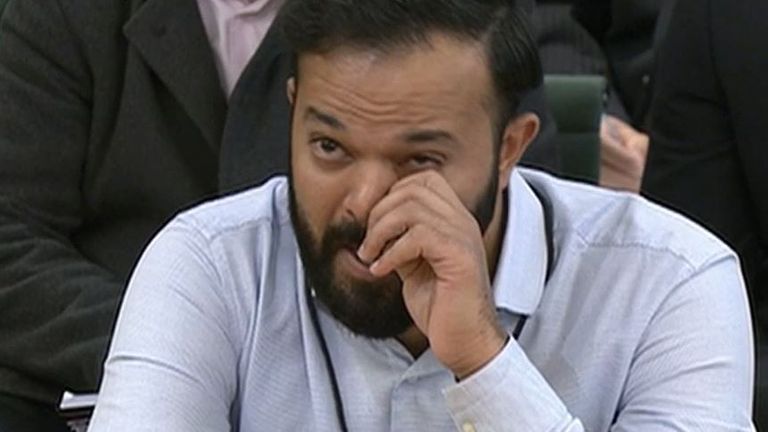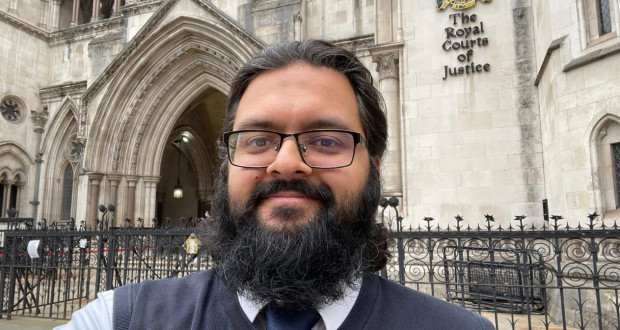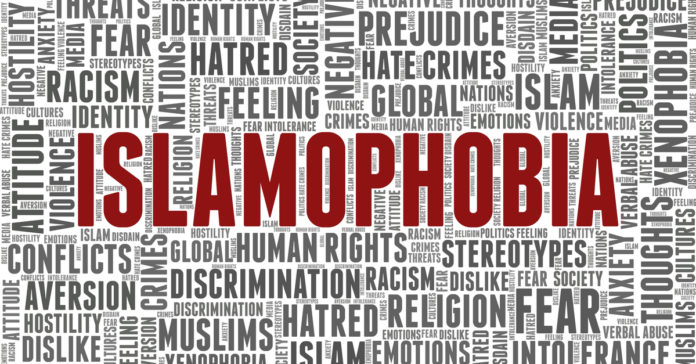The Islamic Human Rights Commission’s Faisal Bodi sees the passing of Islamophobia Awareness Month an opportune time to reflect on the alarming rise of this divisive bigotry on our shores.
Almost ten years have passed since then chairwoman of the Conservative Party Baroness Warsi opined that hostility to Muslims has passed the “dinner table test” whereby “polite society” could comfortably exchange their vile views over a glass of port.
By then of course, the state orchestrated propaganda unleashed to sell the euphemistically named “War on Terror” to the British public had successfully manufactured an open season on Islam in which Muslims were fair game.
The bastard child of the WOT, the Prevent programme, initiated in 2003, institutionalised discrimination against Muslims under the pretext of security. Its Islamophobic policies against a recalcitrant “fifth column” were largely popular even if in the long run they would prove to be the thin end of the wedge of executive erosion of everyone’s civil liberties.
That we even need to raise awareness about Islamophobia, and over a whole month, should itself speak volumes about how normalised, nay fashionable, it has become. Indeed, if it needed underlining, the month has passed with a torrent of high-profile disclosures revealing just how systemic and pervasive the problem is.
Azeem Rafiq
Azeem Rafiq’s revelations about the Islamophobia he endured at Yorkshire Cricket Club are a snapshot of what many Muslims in all fields of life experience on a day-to-day basis. The desecration of a prayer mat by fellow players who had also pinned him down and forced alcohol down his throat, amidst other abuses, speak to a culture so ingrained in the club that such acts are viewed as normal and acceptable.
Subscribe to our newsletter and stay updated on the latest news and updates from around the Muslim world!
It is of course ironic that cricket, a sport which has somehow come to be viewed as the standard of fairness and sportsmanship, should surface as a field in which Islamophobia is rampant. Since Rafiq’s testimony at a parliamentary hearing dozens of people have contacted Yorkshire’s whistleblowing hotline to report their own experiences.

In 1990 the Conservative grandee, Lord Tebitt, coined the term “cricket test” to define the loyalty to Britain of immigrants and their offspring. Tebbit believed that those who supported their countries of origin weren’t sufficiently integrated – “some of them insist on sticking to their own culture, like the Muslims in Bradford and so forth, and they are extremely dangerous.” Fast forward 30 years and Muslims have not just integrated but they have fought against all odds to reach the top of the game – Rafiq has even captained England at youth level – only to be reminded that no matter how much they integrate they will always be regarded as interlopers and non-equals.
Even the reporting of the sordid affair is “just not cricket.” Almost all media coverage ignores the particularly anti-Muslim nature of the bigotry. Reporting it simply as racism supports the notion that while racism based on colour is vile and unacceptable there are cultural variants that are still fair game. More than that, they perpetuate another facet of racism which is to deny agency to the victims to define their own experience.
Ali Abucar Ali and Salman Butt
Even where Muslims excel and perform acts of selfless heroism, their faith is denied due recognition. Take 20-year-old Ali Abucar Ali, who was killed in Brentford last month as he tried to stop his attacker from stabbing an 82-year-old woman. Never ones to miss an opportunity to mention the faith of a Muslim when he/she does something wrong, hardly any media reports noted the fact that Ali was Somali or Muslim. By contrast, just a month earlier, when the MP David Amess was killed, the word ‘Somali’ and the attacker’s Islamic faith was heavily emphasised in reference to the attack.
The era of state Islamophobia unleashed by the WOT is now a fact of life for Muslims. Ask Dr Salman Butt, the chief editor of the Islam21c website, who in November won a lengthy battle to clear his name after being named in a 2015 government press release entitled: “PM’s Extremism Taskforce: tackling extremism in universities and colleges top of the agenda”, as someone who legitimises terrorism.
Despite having no evidence to back up the claim the government insisted on dragging his name through the mud for six years in a bid to destroy his credibility and his career. The tactic of blackballing detractors and opponents by associating them with extremism is being increasingly employed by media and politicians. Indeed, Butt was under no illusions about this saying: “One of the clearest lessons of this case in particular is just how baseless the notion of ‘extremism’ – and therefore ‘counter-extremism’ – actually is. I believe the discourse of extremism is dead. More and more people are realising that it is a nebulous term used by the powerful to silence any thoughts, ideas or speech they do not like or cannot challenge without coercion. It is the ‘heresy’ of today.”

As if all this wasn’t enough to render Muslims a subaltern class, they are now being targeted by the government for deprivation of citizenship under the Nationality and Borders Bill. The extension of government powers to deprive immigrants and their children who have the right to dual nationality of their citizenship will create a two-tier system of justice for British nationals since it will only apply to those with a non-immigrant background.
The Home Secretary already has the right to strip people of citizenship but under the new law victims will not be notified making it impossible for them to challenge the order. There is every reason to believe the law will be applied mainly to Muslims. Of the approximately 150 people who have so far seen their British nationality revoked, the overwhelming majority are Muslim. Citizenship deprivations were used only a handful of times a year, until recently when they rocketed from 14 people in 2016 to 104 in 2017.
Faced with such seemingly insurmountable opposition what should be the Muslim response? Do we continue to engage with a system that is blatantly malign and discriminatory in the distant hope of affecting it from within? Or do we refuse to deal with our oppressors and challenge them from the outside with all the risks that entails?
On 11 and 12 December 2021, IHRC’s annual Islamophobia conference will address the questions posed by Muslim participation in civic and political life in the so-called West, including countries like the UK, the U.S., the European Union, Australia and Canada. Is it possible to tackle racism, Islamophobia and other injustices by working in the system, or must there be complete or near total refusal to work with governmental and other institutions of the state? What are the dilemmas Muslims face and what lessons can be learned from contemporary movements from various communities? These are some of the questions that a learned panel of experts will attempt to answer in this online event.
This article first appeared on the IHRC website.




















